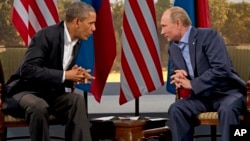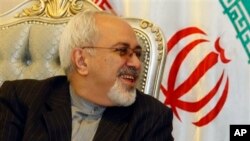WASHINGTON —
Those who follow U.S. foreign policy are understandably suffering a bad case of whiplash.
One day, President Barack Obama is vowing to strike targets in Syria to deter it from using chemical weapons again. A few days later, he appears to be handing the decision to Congress. But before Congress can vote, the president says he will give time to consider a Russian plan to put Syria’s chemical weapons under international control.
The reason for these zigs and zags appears to be in part political. Obama may not believe that Russian President Vladimir Putin - a staunch supporter of the regime of Bashar al-Assad - can deliver a diplomatic solution to the Syria chemical weapons crisis. But the U.S. president, despite a full-court press from his White House and top Cabinet officials over the past 10 days, has not been able since Syrian attacks killed more than 1,000 people outside Damascus on August 21 to convince either the international community or the U.S. Congress to authorize the use of force against Syria.
On Capitol Hill on Tuesday (Sept. 10), hours before Obama addressed the nation from the Oval Office with the latest iteration of his policy, Congressman Jeff Miller, a Republican from Florida on the House Armed Services Committee, challenged Secretary of State John Kerry’s explanation of why the Senate had postponed a debate and vote on a resolution approved by the Senate Foreign Relations Committee last week.
While Kerry said the delay was to allow time to see if the Russian proposal “has meat to it,” Miller said the real reason was “Because they don’t have the votes, Mr. Secretary, you know that.”
In his speech Tuesday night, Obama said it was his decision to ask Congress to delay action while more diplomacy played out.
Letting diplomacy play out
Although the public was not aware of the Russian plan until Monday when Kerry made an offhand remark at a news conference in London, the idea began to take shape months ago and started to crystallize at the G20 meeting in St. Petersburg last week where Obama was conspicuously unable to rally strong support for striking Syria. There are a number of serious questions about how such a plan can be carried out, not least of them which country or countries would be willing to send inspectors and demolition experts to a nation in the throes of civil war and how their safety can be guaranteed.
The proposal has achieved one purpose – beyond sparing Obama a devastating defeat in Congress and defusing the threat of turning him into a lame duck more than three years before he leaves office. Syrian Foreign Minister Walid al-Muallem, in accepting the Russian plan on Monday, admitted for the first time ever that Syria possesses chemical weapons. But Russia rejected an early effort by the U.S. and France to draft a U.N. Security Council resolution authorizing the use of force against Syria if it does not verifiably disarm.
Iraq and Iran
Many arms control experts remember the tortuous process of getting Iraq to give up its weapons of mass destruction after 1991 Gulf War - despite being authorized by the Security Council - and fear that disarming Syria could turn into an even more dangerous game of cat and mouse.
It is, however, unlikely that the Assad regime would dare to use chemical weapons again while the plan is implemented. Congress, meanwhile, is drafting new resolutions that would oblige Assad to surrender the weapons within a strict time limit.
The crisis has also brought an unexpected dividend for U.S.-Iran diplomacy. According to Iranian media, Iran’s new U.S.-educated foreign minister, Mohammed Javad Zarif, has exchanged messages directly with the Obama administration about ways to defuse the situation.
Iranians, who suffered horrific chemical weapons attacks during the 1980-88 Iran-Iraq war, have been appalled by the recent events in Syria. Their new president, Hassan Rouhani, is trying to reduce Iran’s isolation, primarily by achieving a nuclear agreement with the United States that would lead to lifting punishing economic sanctions. Iran also wants to be included in multilateral diplomacy regarding the Syria conflict, which has cost Iran billions of dollars in scarce hard currency and deepened sectarian divisions in the region to the detriment of the world’s largest Shi’ite Muslim nation.
Foreign entanglements
In presenting his case for U.S. action on Syria, President Obama addressed American concerns about becoming entangled in an intractable conflict in which it is hard to distinguish good guys from bad guys and there is “no direct or imminent threat to our security.” Obama also mentioned Iran and his concern that “a failure to stand against the use of chemical weapons would weaken prohibitions against other weapons of mass destruction, and embolden Assad’s ally, Iran -- which must decide whether to ignore international law by building a nuclear weapon, or to take a more peaceful path.” But Obama focused more on the humanitarian case and the United States’ role as the guarantor of last resort in dealing with gross abuses of human rights.
Today, on the 12th anniversary of the 9/11 terror attacks, Americans are understandably weary of shouldering the burden of American “exceptionalism.” It would be ironic if Putin – a former KGB officer – and Rouhani – a veteran apparatchik of the Islamic Republic of Iran – can reduce this burden on the United States in the case of Syria.
As for Assad, while the diplomatic machinations of his allies and the flaws of his opponents may save his skin for a few more months or years, eventually he will face a reckoning, as did the last dictator to employ chemical weapons against his own people, Saddam Hussein.
(To see more of Barbara Slavin's columns, click on the link below)
One day, President Barack Obama is vowing to strike targets in Syria to deter it from using chemical weapons again. A few days later, he appears to be handing the decision to Congress. But before Congress can vote, the president says he will give time to consider a Russian plan to put Syria’s chemical weapons under international control.
The reason for these zigs and zags appears to be in part political. Obama may not believe that Russian President Vladimir Putin - a staunch supporter of the regime of Bashar al-Assad - can deliver a diplomatic solution to the Syria chemical weapons crisis. But the U.S. president, despite a full-court press from his White House and top Cabinet officials over the past 10 days, has not been able since Syrian attacks killed more than 1,000 people outside Damascus on August 21 to convince either the international community or the U.S. Congress to authorize the use of force against Syria.
On Capitol Hill on Tuesday (Sept. 10), hours before Obama addressed the nation from the Oval Office with the latest iteration of his policy, Congressman Jeff Miller, a Republican from Florida on the House Armed Services Committee, challenged Secretary of State John Kerry’s explanation of why the Senate had postponed a debate and vote on a resolution approved by the Senate Foreign Relations Committee last week.
While Kerry said the delay was to allow time to see if the Russian proposal “has meat to it,” Miller said the real reason was “Because they don’t have the votes, Mr. Secretary, you know that.”
In his speech Tuesday night, Obama said it was his decision to ask Congress to delay action while more diplomacy played out.
Letting diplomacy play out
Although the public was not aware of the Russian plan until Monday when Kerry made an offhand remark at a news conference in London, the idea began to take shape months ago and started to crystallize at the G20 meeting in St. Petersburg last week where Obama was conspicuously unable to rally strong support for striking Syria. There are a number of serious questions about how such a plan can be carried out, not least of them which country or countries would be willing to send inspectors and demolition experts to a nation in the throes of civil war and how their safety can be guaranteed.
The proposal has achieved one purpose – beyond sparing Obama a devastating defeat in Congress and defusing the threat of turning him into a lame duck more than three years before he leaves office. Syrian Foreign Minister Walid al-Muallem, in accepting the Russian plan on Monday, admitted for the first time ever that Syria possesses chemical weapons. But Russia rejected an early effort by the U.S. and France to draft a U.N. Security Council resolution authorizing the use of force against Syria if it does not verifiably disarm.
Iraq and Iran
Many arms control experts remember the tortuous process of getting Iraq to give up its weapons of mass destruction after 1991 Gulf War - despite being authorized by the Security Council - and fear that disarming Syria could turn into an even more dangerous game of cat and mouse.
It is, however, unlikely that the Assad regime would dare to use chemical weapons again while the plan is implemented. Congress, meanwhile, is drafting new resolutions that would oblige Assad to surrender the weapons within a strict time limit.
The crisis has also brought an unexpected dividend for U.S.-Iran diplomacy. According to Iranian media, Iran’s new U.S.-educated foreign minister, Mohammed Javad Zarif, has exchanged messages directly with the Obama administration about ways to defuse the situation.
Iranians, who suffered horrific chemical weapons attacks during the 1980-88 Iran-Iraq war, have been appalled by the recent events in Syria. Their new president, Hassan Rouhani, is trying to reduce Iran’s isolation, primarily by achieving a nuclear agreement with the United States that would lead to lifting punishing economic sanctions. Iran also wants to be included in multilateral diplomacy regarding the Syria conflict, which has cost Iran billions of dollars in scarce hard currency and deepened sectarian divisions in the region to the detriment of the world’s largest Shi’ite Muslim nation.
Foreign entanglements
In presenting his case for U.S. action on Syria, President Obama addressed American concerns about becoming entangled in an intractable conflict in which it is hard to distinguish good guys from bad guys and there is “no direct or imminent threat to our security.” Obama also mentioned Iran and his concern that “a failure to stand against the use of chemical weapons would weaken prohibitions against other weapons of mass destruction, and embolden Assad’s ally, Iran -- which must decide whether to ignore international law by building a nuclear weapon, or to take a more peaceful path.” But Obama focused more on the humanitarian case and the United States’ role as the guarantor of last resort in dealing with gross abuses of human rights.
Today, on the 12th anniversary of the 9/11 terror attacks, Americans are understandably weary of shouldering the burden of American “exceptionalism.” It would be ironic if Putin – a former KGB officer – and Rouhani – a veteran apparatchik of the Islamic Republic of Iran – can reduce this burden on the United States in the case of Syria.
As for Assad, while the diplomatic machinations of his allies and the flaws of his opponents may save his skin for a few more months or years, eventually he will face a reckoning, as did the last dictator to employ chemical weapons against his own people, Saddam Hussein.
(To see more of Barbara Slavin's columns, click on the link below)

